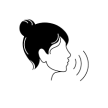
We only use 10% of our brains, but this is not true. The bigger the brain, the smarter the creature, right? Wrong. Size doesn't matter, and you can't prevent a stroke. Actually, hi, I'm Dr. Santoshi Bilakota, a clinical assistant professor in neurology at the NYU Grossman School of Medicine, and I'm Dr. Brad Kamitaki, a neurologist and assistant professor at Rutgers Robert Wood Johnson Medical School. Today, we'll be debunking myths about the human brain. The bigger the brain, the smarter the creature? Size actually does not matter when it comes to the brain because there are creatures out there with bigger brains than us, but probably not as complex. Your brain is really determined by your body proportion. When you think of a big brown bear that's way bigger than us, their brain is going to be bigger, but that doesn't necessarily mean that they are smarter than us. We don't know that for sure because it hasn't been fully studied, but we've seen that in instances such as chimpanzees, they do have smaller brains, but we do know for a fact that chimpanzees are probably as smart as we are. Certainly, it's not the size of the brain that matters, but probably how complex it is and how well-developed certain areas are. Certain areas in humans are, for example, our language centers, which are just much more developed than a cow or even a chimpanzee. That's important in determining intelligence rather than the size itself. Also, how do we measure intelligence? That also becomes tricky because not everyone is intelligent in the same way. Non-cognitive factors.
Playing a role in terms of social intelligence and emotional intelligence is a complex and challenging task to measure accurately. IQ tests are not a reliable measure of intelligence. While normal intelligence tests may assess skills such as executive function, planning, verbal skills, and reading skills, they only provide an approximation of one's abilities and are highly influenced by various factors such as test conditions, emotional state, and educational level. It would be convenient to have a single test or method to determine someone's intelligence, but intelligence is a multifaceted concept that cannot be adequately measured by one or even multiple tests. The popular IQ test originated in the early 1900s as a means to identify French students with cognitive delays and provide them with appropriate resources. However, when it was adopted in America at Stanford, it failed to consider all the factors mentioned earlier. Therefore, achieving high scores on an IQ test does not necessarily indicate significant intelligence. Both of us had to acquire and develop our skills through years of training and education. Education, in its broadest sense, is the most effective means to foster intelligence, although it may not always involve traditional schooling. Some individuals may possess exceptional talents or abilities in specific areas, but this does not guarantee proficiency in all domains. Ultimately, we are all unique individuals with varying strengths and weaknesses.When all of your neurons simultaneously fire, your body hyper-synchronizes and a seizure occurs. Seizures can have various causes, not necessarily epilepsy, which is a lifelong neurological condition. Epilepsy requires multiple unprovoked seizures, distinguishing it from a single seizure. Additionally, individuals with epilepsy need to take daily medication to prevent seizures. If you have experienced your first seizure or have a history of seizures, there are a few important steps to take. Firstly, it is crucial to consult a neurologist who can conduct tests to provide helpful insights. One such test is an EEG, where stickers are placed on your head to analyze brain waves and identify abnormalities. Another test involves imaging, such as MRIs and PET MRIs. If a diagnosis of epilepsy is confirmed, the most important action is to consistently take prescribed medications. Lastly, maintaining open communication with your doctor is essential for achieving a period of seizure freedom. Remember, you only have one brain, and it is your responsibility to take care of it. While there may be some truth in certain myths surrounding seizures, it is important to conduct thorough research and prioritize self-care. v






Comments
There are no comments for this story
Be the first to respond and start the conversation.